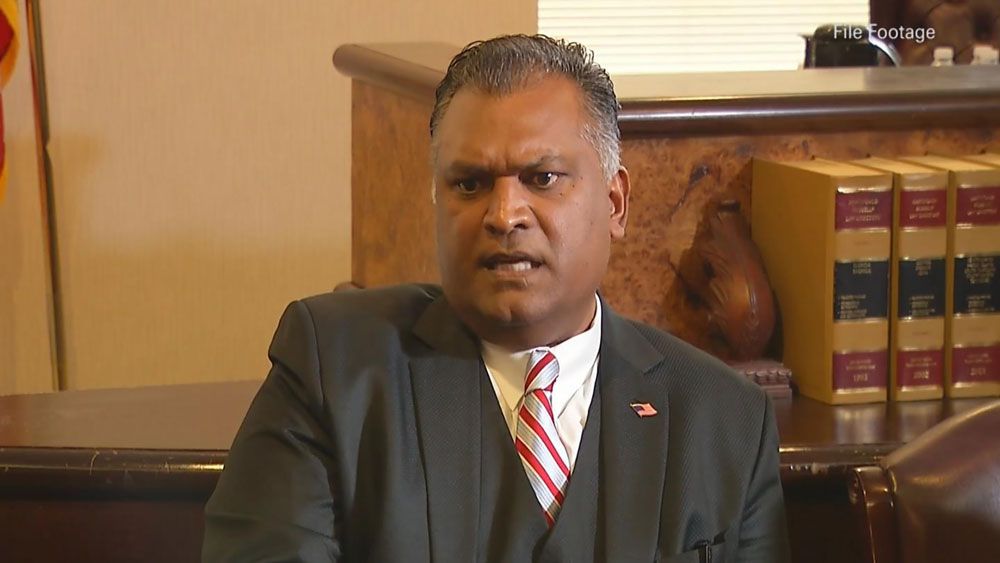ORLANDO, Fla - Prosecutors have closed an investigation into revisions of Orange County Property Appraiser Rick Singh’s expense reports from July 2013 to July 2015 without filing criminal charges, officials announced Friday.
What You Need To Know
- FDLE found 10 possible crimes involving Singh's records
- State prosecutors found "insufficient evidence" for charges
- Probe focused mostly on records changed before 2015 audit
The Florida Department of Law Enforcement found 10 possible crimes and forwarded them to state prosecutors for charging decisions against Singh, who is facing two Democratic challengers in next month’s primary.
Singh, first elected in 2012, is seeking a third, four-year term as Orange’s top appraiser, despite a number of controversies in what is typically a mostly low-profile job.
Prosecutors found instances when "protocol" wasn't followed, when Singh's expense documents were changed before a 2015 audit by the Orange County Comptroller’s Office.
Many involved Singh allegedly directing his staff to remove his name from charges for gas for agency vehicles he drove for work, at the same time he collected a monthly stipend for using his personal vehicle for official business.
At the time, he was collecting $540 to $575 a month as reimbursement for using his personal vehicle for work purposes.
He reportedly had staffers change documents to show “staff” purchased the gas instead of “Singh” to avoid criticism.
The changes, and everything gathered by investigators didn’t amount to crimes that could be successfully prosecuted, Assistant State Attorneys Melissa Clark and Andrew J. Urbanak concluded in a 10-page memo released Friday.
“Based on the testimony, evidence and the applicable laws and regulations there is insufficient evidence to establish criminal activity beyond a reasonable doubt,” the prosecutors said.
In a statement Friday, Singh said he anticipated the no-charges outcome because the allegations had “no merit or proof to back up the charges.”
Singh said two former employees who tried to get him into trouble have been “discredited” by the no-charging decision and an earlier internal investigation conducted by the former chief judge of the Orange-Osceola Circuit Court.
Singh called the allegations “financially and politically motivated.” They included:
Singh directed staffers to delete the phrase “attended the Curry Festival” in Tampa from a travel document Singh submitted.
Singh submitted a photo in an effort to justify his attendance at the festival. The image, taken two years after the event, showed Singh standing by a “reconstructed” festival banner at a park close to Singh’s home.
Singh told staff to remove the reference to an “Orlando Magic” official from a lunch-voucher reimbursement request and simply list it as lunch.
The no-charges decision comes a month before Singh defends himself from two challengers - Amy Mercado and Khalid Muneer - in the August 18 Democratic primary.
The winner will face two write-in candidates - S. Scott Boyd and Tim Loucks - in the November 3 general election.
Clark and Urbanak, the assistant state attorneys, said the way Singh’s documents were altered before the audit did not “follow protocol.”
The “proper method to clarify or supplement a justification for an expense is not to alter the original document, but rather to attach a ‘sticky note’ or to provide additional documentation with the original expense documentation,” the attorneys wrote.
Submitting altered documents did not rise to the level of a crime in this case because there was no evidence Singh benefited financially, they noted.
“The only other alleged benefit Singh received from these alterations was avoiding scrutiny or political criticism/consequences. There are multiple issues with proceeding under that theory,” their memo states. “Legally, it is a stretch that avoiding political criticism/consequences would constitute a violation of the Official Misconduct statute. There is no legal precedent for the theory that avoiding political criticism/consequences under this factual scenario is unlawful.”
FDLE officials launched an investigation into Singh’s altered documents after getting tips from two former employees of Singh’s office in 2018.
Laverne McGee was the communications director for Singh’s office. Aisha Hassan was the director of finance.
They filed a federal lawsuit against Singh in November 2018, alleging the appraiser sexually harassed them and misused public funds. The litigation is ongoing.
A mediation report in May said the “parties have reached an impasse.”
Singh filed a lawsuit against McGee and Hassan in Orange County Circuit Court in February, seeking more than $30,000 in damages and alleging the women wrongly recorded him and tracked him with a GPS device hidden in Singh’s primary work vehicle.
The litigation is ongoing.
Willis C. Perry III – the former human resources manager in Singh’s office - filed a federal suit against Singh in August 2018, alleging he was wrongfully fired after complaining about “unethical, illegal and fraudulent” activities in Singh’s agency.
The dispute was settled in December 2018. The details of the settlement, if any, were not disclosed in court records.
FDLE interviewed Perry, who was later hired by the Orange-Osceola State Attorney’s Office.
That’s why 9th Circuit State Attorney Aramis Ayala declared a conflict and asked Gov. Ron DeSantis to assign the case to a different prosecutor.
FDLE’s case went to the R.J. Larizza’s Office, the 7th Judicial Circuit, which spans Volusia, Flagler, Putnam and St. Johns counties, in January 2020.
“The 7th Circuit took the time for a deep review and came to the same conclusion already reached by the FDLE, who declined to file, and the 9th Circuit, who dodged the issue by citing an unverified conflict of interest,” Singh’s statement said.
“Based solely on allegations of records mis-management, a statement from the 7th Circuit further underscores that the plaintiffs in the aforementioned lawsuit – Laverne McGee and Aisha Hassan – orchestrated many of the claims and later falsely testified about their involvement,” he added. “They also pled the fifth amendment during sworn testimony to protect themselves from self-incrimination.”




